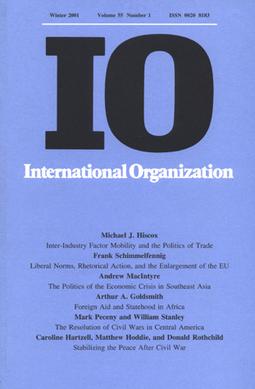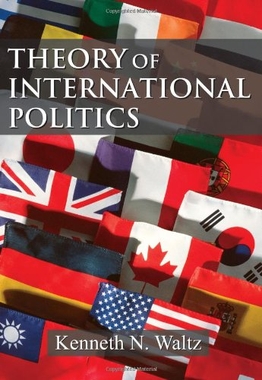Related Research Articles
International political economy (IPE) is the study of how politics shapes the global economy and how the global economy shapes politics. A key focus in IPE is on the distributive consequences of global economic exchange. It has been described as the study of "the political battle between the winners and losers of global economic exchange."

International Organization is a quarterly peer-reviewed academic journal that covers the entire field of international affairs. It was established in 1947 and is published by Cambridge University Press on behalf of the International Organization Foundation. The editor-in-chief is Erik Voeten.

Two-level game theory is a political model, derived from game theory, that illustrates the domestic-international interactions between states. It was originally, introduced in 1988 by Robert D. Putnam, in his publication "Diplomacy and Domestic Politics: The Logic of Two-Level Games".
Helen V. Milner is an American political scientist and the B. C. Forbes Professor of Public Affairs at the Woodrow Wilson School of Public and International Affairs at Princeton University, where she is also the Director of the Niehaus Center for Globalization and Governance. She has written extensively on issues related to international political economy like international trade, the connections between domestic politics and foreign policy, globalization and regionalism, and the relationship between democracy and trade policy.
Historical institutionalism (HI) is a new institutionalist social science approach that emphasizes how timing, sequences and path dependence affect institutions, and shape social, political, economic behavior and change. Unlike functionalist theories and some rational choice approaches, historical institutionalism tends to emphasize that many outcomes are possible, small events and flukes can have large consequences, actions are hard to reverse once they take place, and that outcomes may be inefficient. A critical juncture may set in motion events that are hard to reverse, because of issues related to path dependency. Historical institutionalists tend to focus on history to understand why specific events happen.
Michael Nathan Barnett is a professor of international relations at George Washington University's Elliott School of International Affairs. Known for his Constructivist approach, his scholarship and research has been in the areas of international organizations, international relations theory, and Middle Eastern politics.

Theory of International Politics is a 1979 book on international relations theory by Kenneth Waltz that creates a structural realist theory, neorealism, to explain international relations. Taking into account the influence of neoclassical economic theory, Waltz argued that the fundamental "ordering principle" (p. 88) of the international political system is anarchy, which is defined by the presence of "functionally undifferentiated" (p. 97) individual state actors lacking "relations of super- and subordination" (p. 88) that are distinguished only by their varying capabilities.
James D. Fearon is the Theodore and Francis Geballe Professor of Political Science at Stanford University; he is known for his work on the theory of civil wars, international bargaining, war's inefficiency puzzle, audience costs, and ethnic constructivism. According to a 2011 survey of International Relations scholars, Fearon is among the most influential International Relations scholars of the last twenty years. His 1995 article "Rationalist Explanations for War" is the most assigned journal article in International Relations graduate training at U.S. universities.
Martha Finnemore is an American constructivist scholar of international relations, and University Professor at the Elliott School of International Affairs at George Washington University. She is considered among the most influential international relations scholars. Her scholarship has highlighted the role of norms and culture in international politics, as well as shown that international organizations are consequential and purposive social agents in world politics that can shape state interests.
Rational choice institutionalism (RCI) is a theoretical approach to the study of institutions arguing that actors use institutions to maximize their utility, and that institutions affect rational individual behavior. Rational choice institutionalism arose initially from the study of congressional behaviour in the U.S. in the late 1970s. Influential early RCI scholarship was done by political economists at California Institute of Technology, University of Rochester, and Washington University. It employs analytical tools borrowed from neo-classical economics to explain how institutions are created, the behaviour of political actors within it, and the outcome of strategic interaction.
An audience cost, in international relations theory, is the domestic political cost that leaders incur from their constituency if they escalate a foreign policy crisis and are then seen as backing down. It is considered to be one of the potential mechanisms for democratic peace theory. It is associated with rational choice scholarship in international relations.
In international relations theory, the bargaining model of war is a method of representing the potential gains and losses and ultimate outcome of war between two actors as a bargaining interaction. A central puzzle that motivates research in this vein is the "inefficiency puzzle of war": why do wars occur when it would be better for all parties involved to reach an agreement that goes short of war? In the bargaining model, war between rational actors is possible due to uncertainty and commitment problems. As a result, provision of reliable information and steps to alleviate commitment problems make war less likely. It is an influential strand of rational choice scholarship in the field of international relations.
Duncan Snidal, FBA is professor of international relations at the University of Oxford and professor emeritus at University of Chicago. Snidal has research interests in international relations theory, institutional organizations, cooperation, international law, and rational choice.
Kathleen Thelen is an American political scientist specializing in comparative politics. She is the Ford Professor of Political Science at the Massachusetts Institute of Technology (MIT), a permanent external member of the Max Planck Institute for the Study of Societies (MPIfG), and a faculty associate at the Center for European Studies (CES) at Harvard University.
Jessica L.P. Weeks is an American political scientist. She is Professor and H. Douglas Weaver Chair in Diplomacy and International Relations in the Department of Political Science at the University of Wisconsin-Madison.
Carla Norrlöf is a Swedish-Ethiopian political scientist. She is Associate Professor of Political Science at the University of Toronto. Her research focuses on hegemony, as well as the international political economy of trade, investment and security. Her 2010 book America's Global Advantage: US Hegemony and International Cooperation argues that US hegemony is durable because of its dominance in currency, trade and security. She also argues that the US does not buttress the international system out of altruism, but rather because it derives considerable concrete benefits in being the world's reserve currency, dominant military power, and primary supporter of international markets.
Nuno P. Monteiro was a Portuguese-American political scientist. He was Associate Professor of Political Science at Yale University. He was known for his research within the fields of International Relations and Security Studies, in particular on the topics of unipolarity and nuclear weapons.
Rational choice is a prominent framework in international relations scholarship. Rational choice is not a substantive theory of international politics, but rather a methodological approach that focuses on certain types of social explanation for phenomena. In that sense, it is similar to constructivism, and differs from liberalism and realism, which are substantive theories of world politics. Rationalist analyses have been used to substantiate realist theories, as well as liberal theories of international relations.
In international relations, credibility is the perceived likelihood that a leader or a state follows through on threats and promises that have been made. Credibility is a key component of coercion, as well as the functioning of military alliances. Credibility is related to concepts such as reputation and resolve. Reputation for resolve may be a key component of credibility, but credibility is also highly context-dependent.
In international relations, coercion refers to the imposition of costs by a state on other states and non-state actors to prevent them from taking an action (deterrence) or to compel them to take an action (compellence). Coercion frequently takes the form of threats or the use of limited military force. It is commonly seen as analytically distinct from persuasion, brute force, or full-on war.
References
- 1 2 "Barbara Koremenos | U-M LSA Political Science". lsa.umich.edu. Retrieved 2021-01-03.
- ↑ Westerwinter, Oliver (2017-12-01). "Barbara Koremenos. 2016. The continent of international law. Explaining agreement design. (Cambridge: Cambridge University Press)". The Review of International Organizations. 12 (4): 647–651. doi:10.1007/s11558-017-9274-3. ISSN 1559-744X. S2CID 157895115.
- ↑ Copelovitch, Mark S.; Putnam, Tonya L. (2014). "Design in Context: Existing International Agreements and New Cooperation". International Organization. 68 (2): 471–493. doi:10.1017/S0020818313000441. ISSN 0020-8183. S2CID 55443909.
- ↑ Sandholtz, Wayne (2017). "International Norm Change". Oxford Research Encyclopedia of Politics. doi:10.1093/acrefore/9780190228637.013.588. ISBN 9780190228637.
- ↑ Colgan, Jeff D. (2016-09-01). "Where Is International Relations Going? Evidence from Graduate Training". International Studies Quarterly. 60 (3): 486–498. doi:10.1093/isq/sqv017. ISSN 0020-8833.